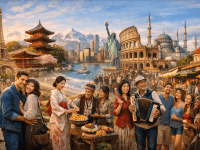Tourism refers to the activity of people traveling to and staying in places outside their usual environment for leisure, business, or other purposes. It involves the movement of people (tourists) to destinations away from their place of residence or work, typically for a limited duration. Tourism sector encompasses a diverse range of experiences, from visiting historical sites and natural attractions to participating in cultural events and enjoying recreational activities.
Key aspects of tourism include:
Travel:
Tourism involves the act of traveling, which can include transportation by air, land, or sea to reach a destination. Travel may be for leisure, business, education, or other reasons.
Leisure and Recreation:
Many tourists engage in leisure activities during their travels, such as sightseeing, visiting landmarks, enjoying beaches, hiking, shopping, dining out, and participating in cultural experiences.
Purpose and Motivation:
Tourists travel for various reasons, including relaxation, adventure, exploration, cultural immersion, visiting friends and family, attending events or conferences, or seeking medical treatment (medical tourism).
Destination:
Tourism is defined by the destination where travelers go. This can be a city, region, country, or specific attraction. Destinations often offer a combination of natural, cultural, historical, and recreational attractions to appeal to tourists.
Hospitality and Accommodation:
Tourism involves the provision of hospitality services, including accommodations like hotels, resorts, guesthouses, vacation rentals, and campgrounds, where tourists stay during their visit.
Tourism Industry:
The tourism sector comprises businesses and organizations that cater to tourists, including hotels, airlines, tour operators, travel agencies, restaurants, transportation services, attractions, and souvenir shops.
Economic Impact:
Tourism contributes significantly to the economy of many countries and regions by generating income, employment opportunities, and tax revenue. It can be a vital source of foreign exchange earnings and economic development, particularly in areas heavily dependent on tourism.
Cultural Exchange:
Tourism facilitates cultural exchange as tourists interact with local communities, experience new traditions, taste local cuisine, and learn about different ways of life.
Environmental and Social Impact:
Sustainable tourism practices aim to minimize negative impacts on the environment and local communities while promoting conservation and responsible travel behaviors.
Tourism is a multifaceted industry with a broad impact on economies, societies, and environments worldwide. It plays a crucial role in promoting cross-cultural understanding, fostering economic growth, and enriching personal experiences.
The tourism sector encompasses a wide range of activities related to travel and hospitality, focusing on people traveling to and staying in places outside their usual environment for leisure, business, or other purposes. This sector plays a significant role in many economies around the world, contributing to employment, economic development, and cultural exchange.
Here are some key aspects and components of the tourism sector:
Hospitality Services:
This includes accommodation services such as hotels, resorts, lodges, hostels, and vacation rentals. Hospitality also extends to restaurants, cafes, bars, and other food and beverage establishments.
Transportation:
Tourism relies heavily on transportation services, including airlines, railways, cruise lines, car rentals, and other modes of transport that facilitate travel to and within destinations.
Tour Operators and Travel Agencies:
These businesses organize and facilitate travel packages, tours, and activities for tourists. They handle logistics such as transportation, accommodations, and excursions.
Attractions and Activities:
Tourism is driven by attractions and activities that draw visitors to specific destinations. These can include natural wonders, cultural sites, theme parks, museums, festivals, and outdoor recreational activities.
Tourism Infrastructure:
This includes the development and maintenance of tourism-related infrastructure such as airports, roads, ports, and tourist facilities (like visitor centers, rest areas, and amenities).
Tourism Marketing and Promotion:
Governments, tourism boards, and private enterprises engage in marketing and promotional activities to attract visitors. This involves advertising campaigns, digital marketing, and participation in trade shows.
Tourism Policy and Regulation:
Governments play a critical role in regulating and supporting the tourism sector through policies related to visas, taxation, safety standards, environmental regulations, and tourism development planning.
Impact on Local Communities:
Tourism can have both positive and negative impacts on local communities. While it generates income and job opportunities, it can also lead to environmental degradation, cultural commodification, and issues related to overtourism.
Sustainable Tourism:
There is a growing emphasis on sustainable tourism practices that minimize negative impacts and promote responsible travel. This includes eco-tourism, community-based tourism, and efforts to conserve natural and cultural heritage.
Technology in Tourism:
The tourism industry has been significantly impacted by technology, with the rise of online booking platforms, travel apps, virtual tours, and digital marketing strategies transforming how people plan and experience trips.
The tourism sector is dynamic and constantly evolving, shaped by changing consumer preferences, global events, technological advancements, and environmental considerations. It remains a key driver of economic growth and cultural exchange worldwide.




